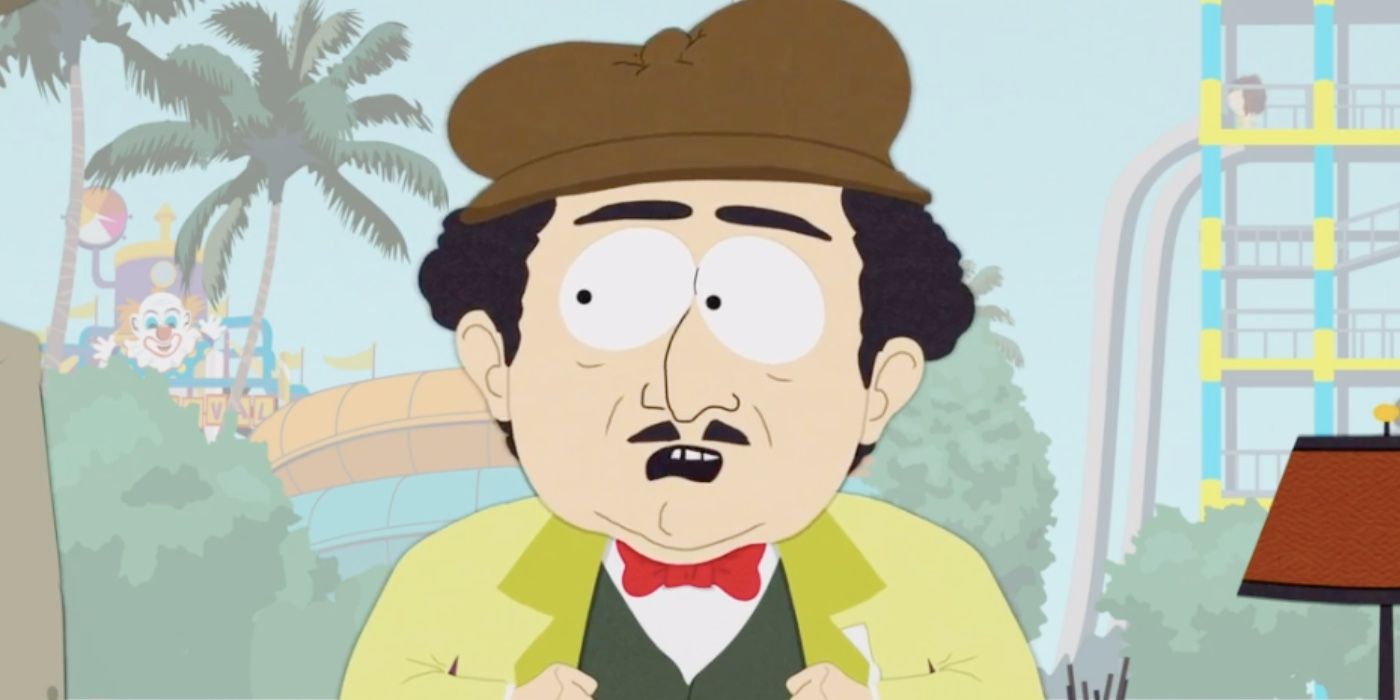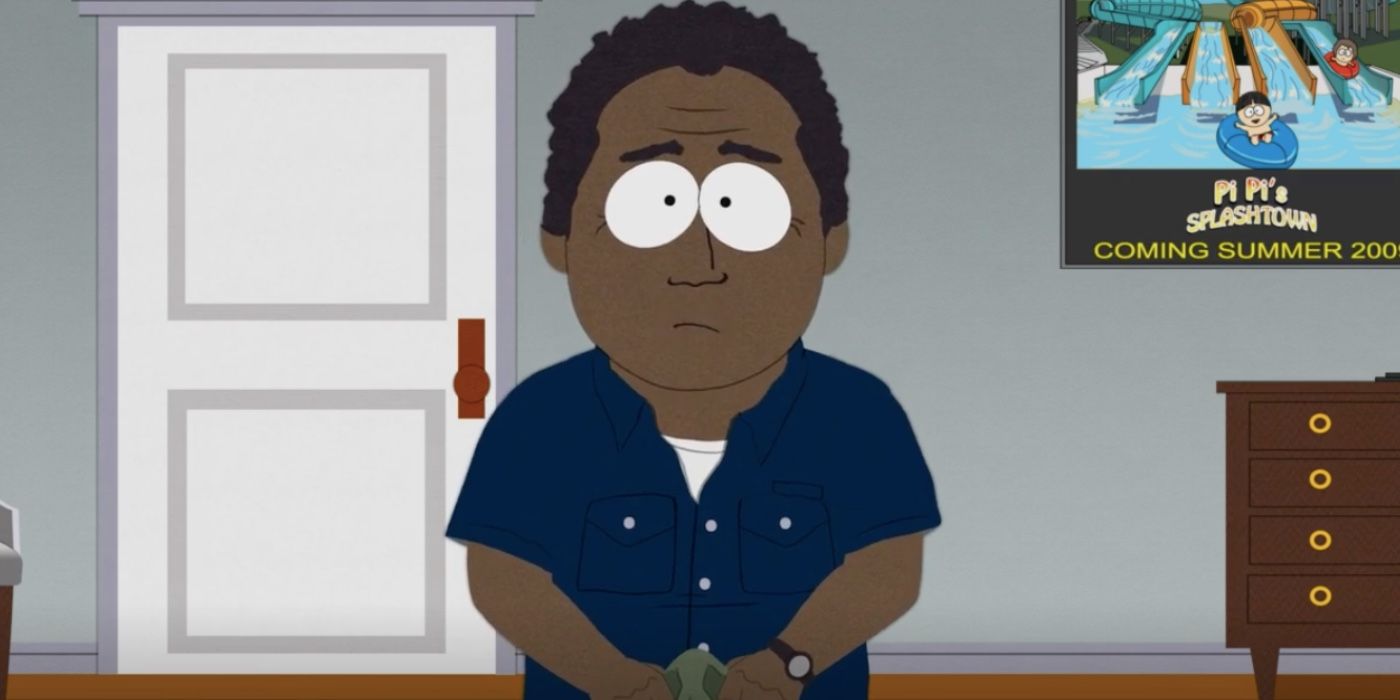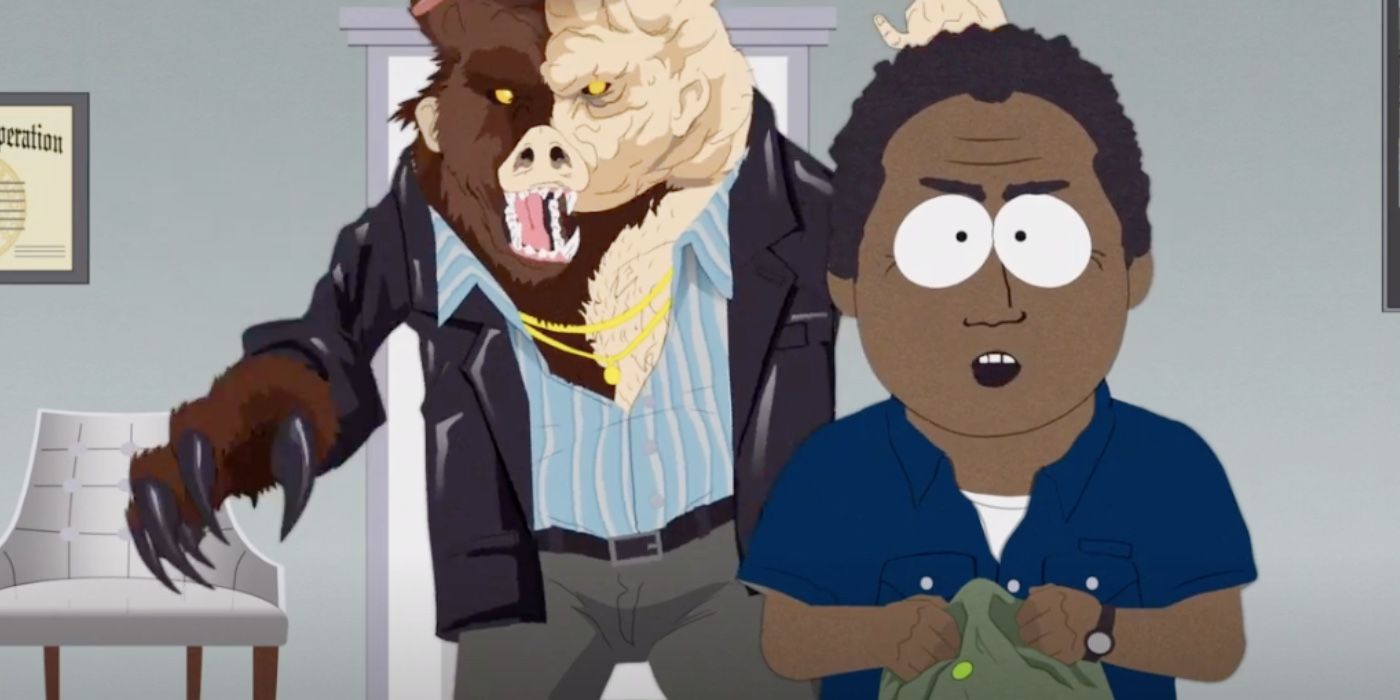The latest feature-length special, South Park: The Streaming Wars, ends on a bleak cliffhanger with the real meaning of the show’s sharp satire in full view. Subtlety has never been South Park’s strong suit. The anarchic animated comedy might take jabs at topical events with fast-paced, raucous satirical wit, but South Park has never been shy about making its points clear.
Often, gore and shock humor are used to underline the show’s salient points, as evidenced when South Park sympathized with Britney Spears by depicting the pop star with half of her head missing. South Park: The Streaming Wars continues the show’s proud history of making social commentary and political points through this sort of gross-out imagery, with the return of ManBearPig allowing South Park to improve the show's poorly-dated take on climate change. In South Park: The Streaming Wars, global warming is a very real, relevant threat, and so are the people profiting from it.
South Park: The Streaming Wars begins with Randy Marsh and his neighbor Steve Black being informed that their competing cannabis farms could sell their excess water for profit if they so choose. Randy and Steve soon set their sons to work building boats to prove that their water streams can be used by civilians and therefore qualify for sale, resulting Stan and Tolkien working for “streaming services” and burning themselves out in the process. While the Tegridy Farms plot allows South Park: The Streaming Wars to satirize the real-life phenomenon of public water supplies being privatized for profit, Stan and Tolkien’s subplot lets the show’s creators complain about the contemporary preponderance of streaming services turning the content creation industry into a burn-out inducing free-for-all that can’t sustain itself. These threads all come together in the finale of South Park: The Streaming Wars - which ends on a brutal twist that leaves far more questions than answers.
What Happens In The Ending of South Park: The Streaming Wars
Steve Black organizes a meeting with Pi Pi, the owner of a local water park who has purchased the water rights to Credigree Weed (Steve’s South Park-based cannabis farm). Pi Pi refuses to return Steve’s water supply, gleefully revealing that he has been working with the corrupt water commissioner and ManBearPig to annex the town’s water supply and ensure he has sole ownership of the resource as its dries up. Pi Pi then sics ManBearPig on Steve, with the monster attacking and possibly killing Tolkien’s father. Pi Pi then double-crosses the water commissioner, allowing ManBearPig to seemingly destroy the minor villain as he unveils his master plan. With no more water left, South Park’s citizens will soon turn to Pi Pi to purchase the only alternative—the waterpark operator’s namesake, urine.
Does Steve Black Die In South Park: The Streaming Wars?
The inconsistent canon of South Park makes it tough to tell whether or not Tolkien’s father is really dead. South Park has serialized its plots before, but Kenny has been killed off in gory fashion countless times on the series and still comes back after each gruesome demise. With this in mind, Steve Black could be dead in South Park: The Streaming Wars Part 2, but the character could also still appear in later episodes. Beyond that, he may have survived by being beaten, stabbed, and thrown out a window by the beast. ManBearPig’s other victim in South Park: The Streaming Wars, Mr. Cussler, is gruesomely dismembered, meaning the monster could have killed Steve outright if he wanted to. Tolkien’s father is last seen alive and still has an unresolved plot line with Randy, making it likely that viewers haven’t seen the last of him, although the water commissioner is less likely to be so lucky in The Streaming Wars Part 2.
What Does The Title’s “Streaming Wars” Refer To?
Like the best of South Park’s season 25 satire, South Park: The Streaming Wars works on two levels. On the surface, the “Streaming Wars” of the title refers to the competition between Steve Black, Randy Marsh, Mr. Cussler, and other landowners attempting to sell their water rights for a profit. However, all of these landowners allow citizens to own a portion of their water rights via a “streaming service” (literally, letting them tap into their farm's stream) and hire Stan, Tolkien, and the rest of the South Park boys to build them toy boats to test their water’s flow downstream. This leaves the young stars of South Park exhausted and burnt out from “signing exclusive deals with multiple streaming services.”
This premise then allows South Park to mock the entertainment industry and how content creators are encouraged to spread themselves thin by an ever-expanding corporate landscape. Mr. Cussler’s claim that he wanted his stream to become the “Amazon” of “streaming services” was a particularly obvious nod to Amazon's streaming service Prime Video, while Butters’ furious rant about how every streaming service would soon seek a buyout and leave them with only three massive streaming services who own everything was another case of South Park: The Streaming Wars underlining the show's take on the recent phenomenon and the effects of monopolization on the entertainment industry.
What The Ending of South Park: The Streaming Wars Really Means
The ending of South Park: The Streaming Wars is a bleak one that will be familiar to fans of the classic film noir Chinatown. The evil Pi Pi ends up achieving all of his goals, with ManBearPig tearing down the dam holding Denver’s water supply in reserve while the local citizens unknowingly waste their precious, limited water. The true meaning of the South Park special is that real-life companies are doing the same thing, with Pi Pi standing in for corporations profiting off water scarcity while ManBearPig acts as an allegory for climate change.
Much like South Park’s Ukraine/Russia satire didn’t depict the US, Russia, or any other individual as the good guy looking to fix a terrible situation, the ending of South Park: The Streaming Wars also depicts only villainous characters and ignorant citizens without anyone intervening to save South Park from the town's upcoming drought. While oil companies were aware of climate change for decades before the public understood the extent of the environmental damage that fossil fuel use wrought (per The Guardian), the corporations used this knowledge to invest in water management as they knew global warming would soon make the resource a hot commodity. Similarly, in the ending of South Park: The Streaming Wars, Pi Pi uses his insider knowledge of ManBearPig’s dangerous antics to anticipate the upcoming drought, stockpiling urine that will soon give him a stranglehold over the entire region when it is the only drinkable resource available to desperate citizens.





